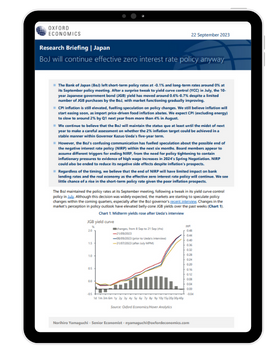BoJ will continue effective zero interest rate policy anyway in Japan

The Bank of Japan (BoJ) maintained the policy rates at its September meeting, following a tweak in its yield curve control policy in July. Although this decision was widely expected, the markets are starting to speculate policy changes within the coming quarters, especially after the BoJ governor’s recent interview.
What you will learn:
- We believe inflation will start easing soon, as import price-driven food inflation abates. CPI (excluding energy) is expected to slow to around 2% by Q1 next year from more than 4% in August.
- We continue to believe that the BoJ will maintain the status quo at least until the midst of next year to make a careful assessment on whether the 2% inflation target could be achieved in a stable manner within Governor Kazuo Ueda’s five-year term.
- However, the BoJ’s confusing communication has fuelled speculation about the possible end of the negative interest rate policy (NIRP) within the next six months.
- Regardless of the timing, we believe that the end of NIRP will have limited impact on bank lending rates and the real economy as the effective zero interest rate policy will continue.
Tags:
Related Posts


Post
Rise of new megacities will drive global urban growth
The population of the world's 1,000 largest and most important global cities is forecast to increase by more than half a billion by 2050. However, this urban demographic growth is not equally distributed across the world's cities.
Find Out More
Post
Chinese Outbound Travel to Gain Momentum in 2024
Chinese outbound travel finally restarted in 2023. This re-opening was keenly anticipated by global destinations, given the significance of China as an outbound market. Chinese outbound travel will stride further towards recovery in 2024.
Find Out More